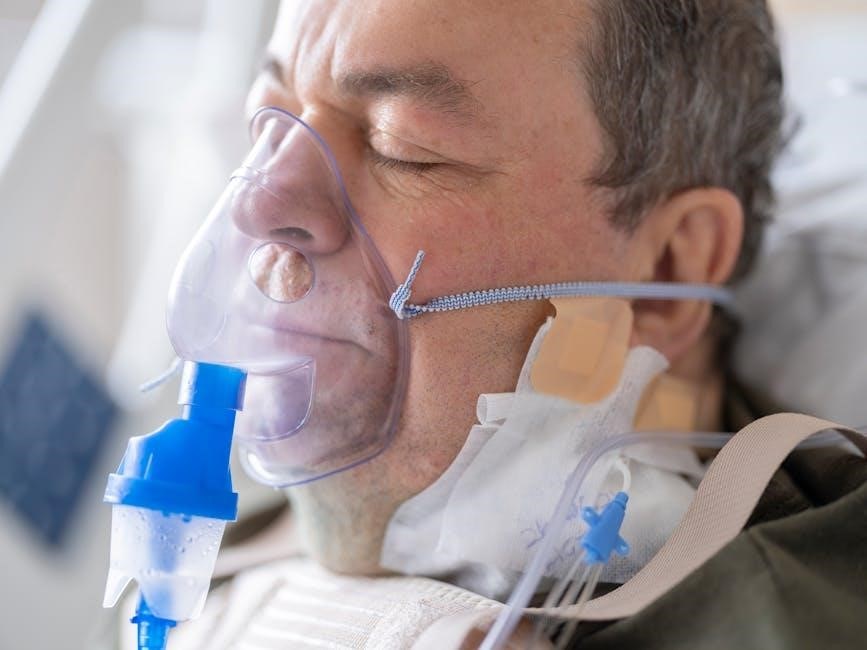Medical Surgical Nursing focuses on caring for adult patients with various medical conditions and surgical interventions. It blends evidence-based practice‚ critical thinking‚ and compassionate care to improve patient outcomes.
1.1 Definition and Scope of Medical Surgical Nursing
Medical Surgical Nursing‚ also known as Adult Health Nursing‚ involves caring for adults with medical and surgical conditions. It focuses on promoting health‚ preventing illness‚ and managing acute and chronic diseases. The scope includes assessing patient needs‚ developing care plans‚ and implementing evidence-based interventions. Nurses work in hospitals‚ clinics‚ and community settings‚ addressing both physiological and psychological aspects of care. The role emphasizes a holistic approach‚ blending the art and science of nursing to improve patient outcomes. Key responsibilities include monitoring vital signs‚ administering medications‚ and educating patients on self-care. The field also requires staying updated on medical advancements and technologies to provide high-quality‚ patient-centered care. This specialty is foundational in healthcare‚ addressing diverse patient needs across various settings.
1.2 Historical Development of Medical Surgical Nursing
Medical Surgical Nursing has its roots in ancient civilizations‚ where early medical practices laid the groundwork for modern care. Florence Nightingale’s contributions during the Crimean War revolutionized nursing‚ emphasizing hygiene‚ observation‚ and patient-centered care. The late 19th and early 20th centuries saw the rise of surgical nursing as a distinct field‚ with advances in anesthesia and aseptic techniques. The integration of medical and surgical nursing emerged in the mid-20th century‚ focusing on holistic patient care. Today‚ it is a cornerstone of healthcare‚ blending evidence-based practice with technological advancements. The specialty continues to evolve‚ addressing complex patient needs and promoting optimal recovery. Historical developments have shaped the role of medical surgical nurses‚ ensuring they remain pivotal in delivering high-quality‚ patient-focused care across diverse healthcare settings.
1.3 Role of the Medical Surgical Nurse
The role of a Medical Surgical Nurse is diverse and critical‚ encompassing the care of adult patients with various medical and surgical conditions. These nurses assess patient needs‚ develop individualized care plans‚ and implement evidence-based interventions. They monitor patient progress‚ administer medications‚ and provide wound care. Additionally‚ they educate patients and families on disease management and recovery strategies. Surgical Nurses assist in the operating room‚ prepare patients for procedures‚ and ensure safety during surgery. Their responsibilities also include maintaining accurate records and collaborating with healthcare teams. The role requires strong communication skills‚ emotional support for patients‚ and the ability to work in fast-paced environments. Medical Surgical Nurses are essential in promoting patient recovery‚ preventing complications‚ and enhancing overall well-being‚ making them a vital component of the healthcare system.

1.4 Importance of Medical Surgical Nursing in Healthcare
Medical Surgical Nursing plays a vital role in the healthcare system by bridging the gap between medical and surgical care. These nurses provide holistic‚ patient-centered care‚ addressing both physical and emotional needs. Their expertise in managing chronic illnesses‚ recovering surgical patients‚ and preventing complications ensures better patient outcomes. Medical Surgical Nurses are essential in educating patients about disease management‚ promoting health literacy‚ and facilitating smooth transitions between care settings. Their role in early detection of health issues and timely interventions reduces hospital readmissions and improves quality of life. By integrating evidence-based practices‚ they enhance the efficiency and safety of care delivery. Ultimately‚ Medical Surgical Nurses are indispensable in maintaining high standards of patient care‚ making them a cornerstone of the healthcare system.

Patient Assessment and Care Planning
Patient assessment and care planning are critical for delivering personalized‚ evidence-based care. Accurate evaluations ensure tailored interventions‚ promoting safe and effective outcomes.
2.1 Physical Assessment Techniques
Physical assessment techniques are essential for evaluating a patient’s health status. These include inspection‚ palpation‚ percussion‚ and auscultation. Inspection involves observing body systems‚ noting abnormalities like skin lesions or edema. Palpation uses touch to assess tenderness‚ masses‚ or organ enlargement. Percussion helps determine organ density through sound. Auscultation involves listening to sounds like heart or lung abnormalities. Vital signs‚ such as temperature‚ pulse‚ and blood pressure‚ are also critical. Nurses use these techniques to gather data‚ identify deviations from normal‚ and guide care. Regular assessments help detect changes‚ enabling timely interventions and improving patient outcomes. Proficiency in these skills is vital for accurate diagnosis and effective care planning in medical surgical nursing.
2.2 Nursing Diagnosis and Care Priorities
Nursing diagnosis involves identifying specific patient problems that require nursing interventions. Care priorities are determined based on the severity of the condition‚ patient safety‚ and immediate needs. Nurses assess physiological‚ psychological‚ and social factors to formulate accurate diagnoses. For example‚ a patient with chest pain may have a priority diagnosis of acute coronary syndrome. Care priorities are set using frameworks like Maslow’s hierarchy or the ABC (Airway‚ Breathing‚ Circulation) approach. Effective prioritization ensures timely and appropriate interventions‚ improving patient outcomes. Nurses continuously reassess and adjust priorities as the patient’s condition evolves. This process is crucial for delivering individualized‚ evidence-based care in medical surgical nursing.
2.3 Developing Individualized Care Plans
Developing individualized care plans is essential for addressing patients’ unique needs and promoting optimal outcomes. These plans are created based on the nursing diagnosis‚ patient goals‚ and priorities. Nurses collaborate with the healthcare team to tailor interventions specific to the patient’s condition‚ preferences‚ and lifestyle. Care plans include measurable‚ achievable‚ relevant‚ and time-bound (SMART) goals. For example‚ a patient with diabetes may have a goal to maintain blood glucose levels within a target range. The plan outlines nursing actions‚ such as medication administration‚ education‚ and monitoring. Regular updates and patient involvement ensure the plan remains relevant and effective. Individualized care plans enhance patient-centered care and improve adherence to treatment‚ ultimately leading to better health outcomes and satisfaction.
2.4 Monitoring and Evaluating Patient Outcomes
Monitoring and evaluating patient outcomes are critical steps in ensuring the effectiveness of care. Nurses regularly assess patients’ progress toward meeting established goals and identify any deviations from expected outcomes. This process involves collecting data through physical assessments‚ lab results‚ and patient feedback. The information is analyzed to determine if interventions are working or if adjustments are needed. Timely evaluation helps in modifying care plans to address unmet needs or new challenges. Effective communication with the healthcare team ensures coordinated efforts. Documentation of outcomes is essential for accountability and continuity of care. Patient education is also reinforced during this phase to promote adherence to treatment. Continuous monitoring and evaluation improve the quality of care and patient safety‚ ensuring the best possible results. This process is integral to delivering evidence-based‚ patient-centered nursing care.

Surgical Nursing Interventions
Surgical Nursing Interventions involve preoperative‚ intraoperative‚ and postoperative care‚ focusing on patient safety‚ recovery‚ and addressing surgical site infections to optimize outcomes.
3.1 Preoperative Nursing Care
Preoperative nursing care is a critical phase that ensures patients are physically‚ emotionally‚ and educationally prepared for surgery. Key responsibilities include conducting thorough patient assessments‚ reviewing medical histories‚ and identifying potential risks. Nurses also educate patients about the procedure‚ expected outcomes‚ and postoperative care. Ensuring informed consent is obtained and addressing any anxieties or concerns is vital. Additionally‚ preoperative care involves preparing the patient physically‚ such as administering medications‚ ensuring proper hydration‚ and adhering to fasting protocols. Nurses also play a role in infection prevention by preparing the skin and administering prophylactic antibiotics when necessary. Effective communication with the surgical team and ensuring all preoperative checks are completed are essential to safeguard patient safety and optimize surgical outcomes.
3.2 Intraoperative Nursing Roles
Intraoperative nursing roles focus on ensuring patient safety and supporting the surgical team during procedures. Circulating nurses manage the operating room environment‚ maintain asepsis‚ and monitor equipment. They also assist with patient positioning‚ prepare surgical supplies‚ and document key details. Scrub nurses work directly with surgeons‚ passing instruments and maintaining the sterile field. Both roles require strong communication skills to anticipate needs and respond to emergencies. Monitoring patient vital signs and ensuring comfort are critical. Additionally‚ nurses advocate for patients by ensuring all safety protocols are followed. Their role is integral to the smooth execution of surgical procedures‚ making them essential members of the perioperative team. Their attention to detail and ability to work under pressure contribute to positive surgical outcomes.
3.3 Postoperative Nursing Care
Postoperative nursing care focuses on promoting recovery‚ managing pain‚ and preventing complications. Nurses monitor vital signs‚ assess surgical sites for bleeding or infection‚ and ensure proper wound dressing. Pain management is prioritized‚ often using medications and non-pharmacological interventions. Patients are encouraged to cough and breathe deeply to prevent respiratory issues. Mobility is promoted to avoid complications like deep vein thrombosis. Nurses also provide education on medication use‚ wound care‚ and follow-up appointments. Emotional support is offered to address anxiety or fear. Collaboration with the healthcare team ensures a smooth transition to the recovery room or hospital unit. Effective communication with patients and families fosters trust and adherence to postoperative instructions‚ enhancing overall recovery outcomes.
3.4 Managing Surgical Site Infections
Managing surgical site infections (SSIs) is critical to prevent complications and promote healing. SSIs are infections occurring at the surgical site within 30 days of the procedure. Nurses play a key role in prevention by ensuring proper hand hygiene‚ using sterile techniques‚ and maintaining asepsis during dressing changes. Preoperative skin preparation with antimicrobial agents and timely removal of invasive devices reduce infection risk. Early detection involves monitoring for signs like redness‚ swelling‚ or purulent drainage. Treatment may include antibiotics and wound debridement. Nurses educate patients on wound care and signs of infection. Proper documentation and reporting of SSI cases are essential for quality improvement. Collaboration with the surgical team ensures comprehensive management‚ reducing morbidity and improving patient outcomes.

Medical Conditions and Nursing Management
Nurses manage various medical conditions‚ including cardiovascular‚ respiratory‚ gastrointestinal‚ and genitourinary disorders. Assessment and evidence-based interventions are critical for effective patient care and optimal outcomes.
4.1 Cardiovascular Disorders and Nursing Care
Cardiovascular disorders‚ such as coronary artery disease‚ heart failure‚ and hypertension‚ require comprehensive nursing care. Nurses assess patients for symptoms like chest pain‚ dyspnea‚ and edema. Monitoring vital signs‚ including blood pressure and cardiac rhythms‚ is crucial. Interventions include administering medications like nitrates‚ beta-blockers‚ and diuretics‚ as well as providing oxygen therapy. Pain management‚ particularly for myocardial infarction‚ involves analgesics and reassurance. Nurses also educate patients on lifestyle modifications‚ such as a low-sodium diet‚ smoking cessation‚ and regular exercise. Monitoring for complications like arrhythmias or pulmonary edema is essential. Individualized care plans focus on improving cardiac function‚ reducing risk factors‚ and enhancing quality of life. Collaboration with cardiologists and other healthcare providers ensures holistic management and promotes optimal patient outcomes.
4.2 Respiratory Conditions and Nursing Interventions
Respiratory conditions‚ such as chronic obstructive pulmonary disease (COPD)‚ pneumonia‚ and asthma‚ require targeted nursing interventions. Nurses assess respiratory status through lung sounds‚ oxygen saturation‚ and arterial blood gas (ABG) analysis. Interventions include oxygen therapy‚ nebulizers‚ and medications like bronchodilators. Positioning patients upright can improve breathing. Chest physiotherapy and suctioning help clear secretions. Nurses educate patients on inhaler use‚ energy conservation‚ and smoking cessation. Monitoring for signs of respiratory failure‚ such as decreased consciousness or abnormal ABGs‚ is critical. Documentation of respiratory status and response to treatments ensures continuity of care. Collaborating with respiratory therapists and physicians optimizes patient outcomes. Individualized care plans focus on improving oxygenation and reducing symptoms‚ enhancing the patient’s quality of life and functional capacity.
4.3 Gastrointestinal Disorders and Management
Gastrointestinal (GI) disorders‚ such as peptic ulcers‚ inflammatory bowel disease (IBD)‚ and colorectal cancer‚ require comprehensive nursing care. Nurses assess symptoms like abdominal pain‚ nausea‚ and altered bowel habits. Interventions focus on promoting healing‚ managing symptoms‚ and preventing complications. Dietary modifications‚ such as a low-fiber or high-protein diet‚ are tailored to the condition. Administering medications like antacids‚ anti-inflammatory agents‚ and chemotherapy is a key responsibility. Nurses also educate patients on lifestyle changes and stress reduction. Monitoring for signs of GI bleeding or perforation is crucial. Wound care for ostomies or surgical sites ensures proper healing. Collaborating with dietitians and physicians enhances patient outcomes. Documentation of bowel movements and nutritional status guides care planning‚ improving the patient’s quality of life and promoting recovery. Early detection of complications ensures timely interventions.
4.4 Genitourinary and Reproductive Health Issues
Genitourinary and reproductive health issues are common in medical surgical nursing‚ requiring specialized care. Conditions such as urinary tract infections (UTIs)‚ kidney stones‚ and reproductive disorders like menstrual irregularities or sexually transmitted infections (STIs) are frequently encountered. Nurses assess symptoms such as dysuria‚ pelvic pain‚ or abnormal vaginal bleeding. Accurate diagnosis is supported by urinalysis‚ pelvic exams‚ or imaging studies. Nursing care focuses on promoting comfort‚ preventing complications‚ and educating patients on hygiene practices. For example‚ encouraging adequate hydration for UTI prevention or teaching about contraceptive options. Supportive care includes pain management‚ wound care for surgical interventions‚ and emotional support for sensitive issues. Nurses also play a key role in promoting health screenings‚ such as Pap smears‚ to detect conditions early. Effective communication and confidentiality are essential in addressing these intimate health concerns‚ ensuring holistic patient care and empowerment. Regular follow-ups are crucial for monitoring treatment efficacy and patient well-being.

Legal and Ethical Considerations

Legal and ethical considerations are crucial in medical surgical nursing‚ ensuring adherence to laws‚ preventing negligence‚ and upholding patient rights. Ethical principles guide respectful‚ just‚ and compassionate care practices.

5.1 Informed Consent and Patient Rights
Informed consent is a legal and ethical cornerstone in healthcare‚ ensuring patients are fully aware of their treatment options‚ risks‚ and benefits. Medical surgical nurses play a pivotal role in facilitating this process‚ ensuring patients understand procedures and make autonomous decisions. Patient rights‚ including autonomy‚ dignity‚ and confidentiality‚ must be upheld throughout care delivery. Nurses are responsible for educating patients about their rights and ensuring they are respected. This includes providing clear‚ unbiased information and addressing any concerns or questions patients may have. Respecting patient rights fosters trust and ensures ethical care practices. Nurses must also advocate for patients when necessary‚ ensuring their voices are heard and their decisions honored. This ethical obligation is fundamental to maintaining the integrity of the nurse-patient relationship and upholding healthcare standards.
5.2 Confidentiality and Privacy in Nursing Practice
Confidentiality and privacy are fundamental ethical and legal standards in nursing practice‚ ensuring that patients’ personal and medical information is protected. Nurses are obligated to safeguard patient data‚ only sharing it with authorized individuals or when legally required. Privacy involves respecting patients’ personal boundaries and ensuring their care is conducted in a manner that maintains dignity. Breaches of confidentiality or privacy can lead to legal consequences and erosion of patient trust. Nurses must adhere to regulations like HIPAA to ensure compliance. Maintaining confidentiality also extends to avoiding discussions about patients in public areas or with unauthorized individuals. Secure storage of patient records and cautious sharing of information are critical. Privacy and confidentiality are essential for fostering a trusting relationship between nurses and patients‚ ensuring a safe and respectful care environment.
5.3 Ethical Dilemmas in Medical Surgical Nursing
Ethical dilemmas are common in medical surgical nursing‚ requiring nurses to make difficult decisions that balance patient needs‚ professional standards‚ and personal values. These dilemmas often arise in situations involving end-of-life care‚ informed consent‚ resource allocation‚ and patient autonomy. For example‚ nurses may face challenges when patients refuse life-saving treatments or when families disagree on care decisions. Principles such as beneficence‚ non-maleficence‚ autonomy‚ and justice guide nurses in navigating these complex situations. Effective communication‚ collaboration with the healthcare team‚ and adherence to ethical frameworks are essential. Nurses must also seek support through institutional ethics committees or mentorship to manage the emotional and professional challenges posed by ethical dilemmas. Addressing these issues with empathy and integrity ensures high-quality‚ patient-centered care.
5.4 Legal Implications of Nursing Actions
Legal implications of nursing actions are critical in medical surgical nursing‚ as nurses must adhere to laws and regulations governing healthcare. Negligence‚ malpractice‚ and violation of patient rights can lead to legal consequences. Nurses must ensure informed consent is obtained‚ maintain confidentiality‚ and avoid actions that could result in harm. Documentation accuracy is vital‚ as it serves as evidence in legal cases. Understanding state-specific nursing practice acts and federal laws‚ such as HIPAA‚ is essential. Failure to comply can result in lawsuits‚ fines‚ or loss of licensure. Nurses must stay updated on legal standards and seek guidance when uncertain. Adhering to ethical and legal frameworks protects both patients and nurses‚ ensuring safe and accountable care.

Documentation and Reporting

Accurate documentation and reporting are crucial in medical surgical nursing‚ ensuring clear communication‚ continuity of care‚ and legal compliance. Using EHRs enhances efficiency‚ maintains patient confidentiality‚ and supports informed decision-making.
6.1 Effective Communication in Nursing Documentation
Effective communication in nursing documentation is vital for ensuring continuity of care and legal accountability. Nurses must use clear‚ concise‚ and precise language to avoid ambiguity. Proper terminology and standardized formats help maintain consistency. Documentation should reflect the patient’s condition‚ interventions‚ and responses accurately. Using SBAR (Situation‚ Background‚ Assessment‚ Recommendation) frameworks can enhance clarity‚ especially during handoffs. Timely and accurate documentation prevents errors and improves patient safety. Including patient-centered language and cultural sensitivity ensures respect for individual needs. Regular audits of documentation can identify gaps and improve practice. By adhering to these principles‚ nurses ensure that documentation serves as a reliable communication tool‚ supporting seamless care delivery and professional accountability.
6.2 Accurate Reporting of Patient Data
Accurate reporting of patient data is essential for maintaining high-quality care and accountability. Nurses must ensure that all recorded information‚ such as vital signs‚ medical histories‚ and treatment responses‚ is precise and up-to-date. Errors in documentation can lead to misdiagnoses or inappropriate interventions‚ compromising patient safety. To achieve accuracy‚ nurses should verify data at the source‚ use standardized tools‚ and avoid assumptions. Timely updates are critical‚ as delays can disrupt care continuity. Using clear and consistent terminology helps prevent misunderstandings. Additionally‚ cross-checking data with other healthcare team members enhances reliability. Accurate reporting also supports legal compliance and defends nursing actions in court. By prioritizing precision and thoroughness‚ nurses contribute to better clinical decision-making and improved patient outcomes. This practice upholds professional standards and fosters trust in the healthcare system.
6.3 Using Electronic Health Records (EHRs)
Electronic Health Records (EHRs) are digital systems that store patient health information‚ enhancing care coordination and accessibility. They enable nurses to access real-time data‚ reducing errors and improving decision-making. EHRs facilitate standardized documentation‚ ensuring consistency and clarity in patient records. Nurses can track progress‚ monitor lab results‚ and manage medications efficiently. Automated alerts for allergies or potential drug interactions improve patient safety. Additionally‚ EHRs support communication among healthcare providers‚ promoting a collaborative approach. However‚ their effectiveness depends on accurate data entry and proper training. Nurses must adhere to confidentiality and security protocols to protect patient information. Overall‚ EHRs streamline workflows‚ enhance patient outcomes‚ and support evidence-based practice in medical-surgical nursing. Their integration into clinical settings is vital for modern healthcare delivery.
